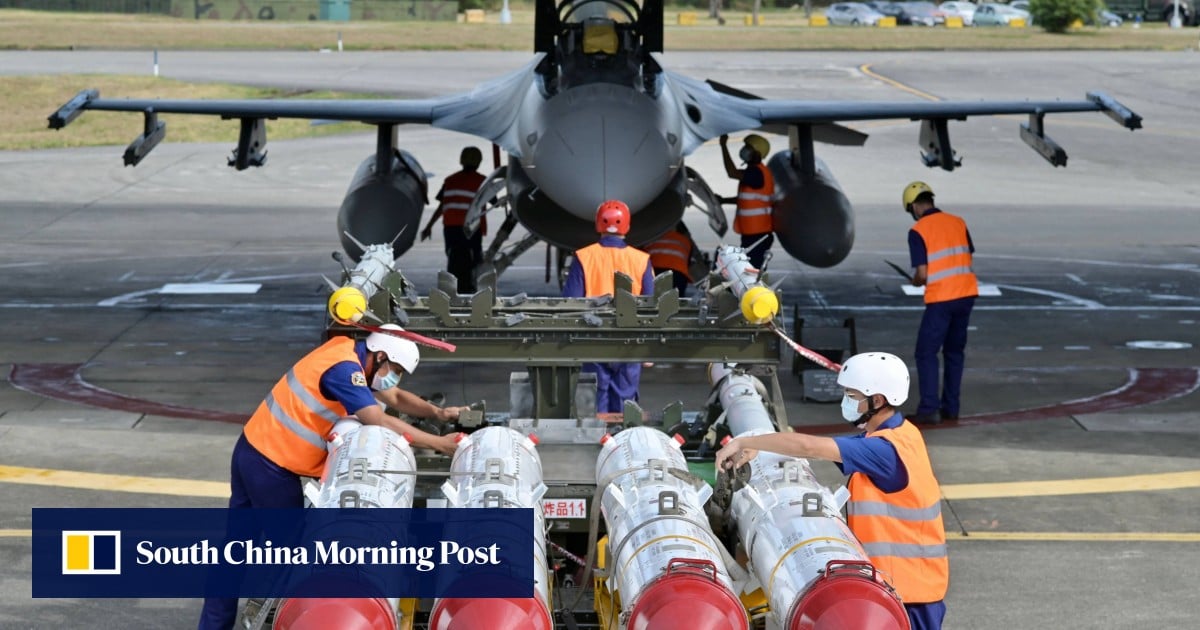Hamartia Antidote
ELITE MEMBER

- Joined
- Nov 17, 2013
- Messages
- 35,188
- Reaction score
- 30
- Country
- Location

Fighter jets, drones in focus as Taiwan, US arms producers eye closer ties
Taiwan hopes to build advanced jets with US support, and seeks unmanned aerial systems technology to boost asymmetric capabilities against PLA, defence industry forum in Taipei hears.
- About 30 American arms contractors attend bilateral defence industry forum in Taipei as geopolitical situation seen to create ‘urgency’ for cooperation
- Taiwan hopes to build advanced jets with US support, and seeks unmanned aerial systems technology to boost asymmetric edge against PLA, forum hears

A leading Taiwanese defence contractor is currently working with America’s Lockheed Martin to upgrade the island’s fleet of F-16s to the more advanced F-16V version. Photo: AFP
Next-generation fighter jets and cutting-edge unmanned military devices are among areas where Taiwan can cooperate with the United States, the island’s defence industry leaders told a group of visiting US arms suppliers on Wednesday.
Hu Kai-hung, chairman of Taichung-based defence contractor Aerospace Industrial Development Corp (AIDC), said business opportunities abounded in Taiwan as it looked to acquire more advanced military planes.
“When it comes to the development of the next-generation fighter, we look forward to the support from the US to build the jet ourselves, including the engine, avionics, control systems, environmental controls and so on,” Hu told the Taiwan-US Defence Industry Forum in Taipei. This was a potential area for defence sector partnership, he added.
The forum brought together US and Taiwanese companies to discuss the challenges for bilateral cooperation in the defence industry supply chain.
Some 30 US defence contractors, including giants Lockheed Martin and Raytheon, are on a weeklong visit to Taipei until Saturday to look for potential partners.
Heading the delegation are Rupert Hammond-Chambers, president of the US-Taiwan Business Council, and Steven Rudder, a retired American three-star general and naval aviator.
According to Hammond-Chambers, the forum discussed opportunities for partnerships, and how Taiwanese companies should position themselves to show they could be dependable partners, as well as ways to integrate Taiwan’s industrial capabilities into the global defence supply chain.
Hu said AIDC was on track to deliver 66 advanced jet trainers to the island’s air force by 2026, after completing the prototype and starting mass production of the pilot-training aircraft last year
AIDC, which built Taiwan’s Indigenous Defence Fighter combat aircraft in the 1990s, is working with Lockheed Martin to upgrade the island’s fleet of F-16s – a Lockheed staple – to the more advanced F-16V version. AIDC also built an F-16 maintenance centre in Taiwan with Lockheed’s support in 2020.
Hu said 55 per cent of the advanced jet trainer, including its design, structure, assembling and software, were developed locally.
AIDC needed to buy the rest of the key systems from abroad, which presented an opportunity for partnerships between US and Taiwanese firms, he said.
Max Lo, chairman of the Taiwan National Drone Industry Association, said the regional geopolitical situation had “created an urgency” for defence industry cooperation with the US.
The mainland military had scaled up its intimidation of Taiwan, he said, including more intense drills around the self-ruled island and sending combat drones to circle it.
Taiwan could expand the development of unmanned aerial systems (UAS) as a kind of asymmetric strategy against the People’s Liberation Army, Lo said, calling on the United States to sell the advanced hardware to Taiwan.
“The US could also transfer UAS technology to Taiwan, which would allow it to develop and manufacture its own UAS industry,” he added.
Taiwan has been under constant military threat in recent years from Beijing, which sees the island as breakaway territory that must be brought back under control, by force if necessary.
Most countries, including the US, do not recognise Taiwan as an independent state but are opposed to any forcible change in the status quo.
Addressing the same forum, Rudder said US suppliers were seeking dependable partners on the island as they wanted to be “part of the self-defence capability of Taiwan”.
“We want to make sure that the supply chain resilience … is preserved in Taiwan and expands in the international space,” said Rudder, a former No 2 officer in the US Marines who was deputy commandant for aviation from 2017 till his retirement last year.
“For the Asia-Pacific, I would offer there’s not another more important area in the world to maintain peace.”
